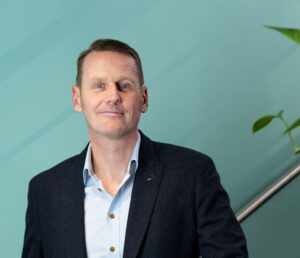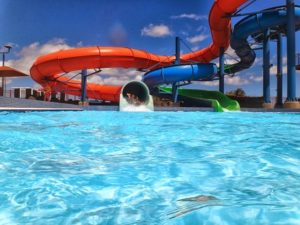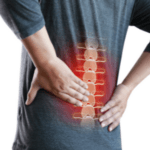The ‘only safety scheme’ that certifies all types of leisure attractions is due to feature at Safety & Health Expo 2023.
A fast-growing safety certification scheme for the leisure industry is the first in the UK to certify the safety of equipment as well as independent inspectors.
Launched in January 2022, the Leisure Equipment & Asset Protection Scheme (or LEAPS) is growing at a rapid clip domestically but has international ambitions too, the scheme’s general manager, Jon Ruddock, tells SHP in the following Q&A.
Together with Melvin Sandell, LEAPS founder and Principal Consultant at Finch Consulting, Ruddock will talk about the scheme’s plan for improving safety at theme parks, high ropes courses and other leisure facilities at Safety & Health Expo, ExCeL London, on 16 May.
SHP: What has LEAPS achieved so far?

Jon Ruddock, LEAP Scheme
Jon Ruddock (JR): We’ve got 11 inspection bodies and about 15 parks and [other leisure attractions] signed up to date.
There’s Paultons Park in Hampshire, Blackgang Chine on the Isle of Wight [the UK’s oldest theme park], ROARR! in Norfolk and 360 Play, which has seven soft play sites.
BALPPA, the British Association of Leisure Parks, Piers and Attractions, was quite an early win for us. A site has to use either LEAPS or one other scheme if they are a BALPPA member – we intend to keep improving our offer so that hopefully one day we’ll be the only approved scheme.
We’ve got our first farm park on board: Avon Valley Farm Park. National Farm Attractions Network chair Doug Douglas joined the scheme so we’re hoping that more farmland attractions will come in as well. Farm parks is a growing market for us so hopefully we can apply more safety to that area.
We’re getting more on board all the time. We are speaking to a number of large UK-based parks and we hope to sign up our first international park in the coming months too.
We check, monitor, verify and audit the inspection bodies to check that they’re competent to do their job, and once they go on our register we will continue that monitoring and auditing process.
[A leisure attraction] can pick somebody off that list and know that they’ve been scrutinised to the nth degree and will continue to be monitored.
We do more than that as we will certify the operation of our clients too. This is self-certification at present, with them signing up to our scheme operating procedures where they agree to manage their rides’ safety, have appropriately trained staff, carry out appropriate maintenance etc…
So LEAPS will not only certify the independent inspector but will also certify the safety of the equipment and how it is operated. We think this is a first certainly in the UK and potentially globally too.
A lot of accidents/incidents occur due to an error in the operation, so if we can add an extra layer of checks then we think this will help to eradicate some of those errors which lead to accidents. In the future we intend to offer operational audits as well for those that want to go the extra mile.
SHP: So LEAPS has achieved a lot in a short space of time. What’s your vision for the scheme’s development over the next 5-10 years?
JR: Our main focus is to reduce the UK’s accident rate. Come on board with us and we will help you mitigate risk.
 I know that the LEAPS model is agile and able to adapt to any leisure requirement such as trampoline parks, aqua parks, inflatable parks, FECs [family entertainment centres] as well as the more traditional theme parks. We are currently talking to the Active Indoor Leisure Association about LEAPS being their chosen scheme to help their members prove their competence.
I know that the LEAPS model is agile and able to adapt to any leisure requirement such as trampoline parks, aqua parks, inflatable parks, FECs [family entertainment centres] as well as the more traditional theme parks. We are currently talking to the Active Indoor Leisure Association about LEAPS being their chosen scheme to help their members prove their competence.
But we have global aspirations too. Nobody else is doing this around the world.
A lot of UK health and safety law is copied in places like Hong Kong and Australia because we’ve got quite a strong track record in health and safety.
We think that if we get it right in the UK then we can help emerging nations like India, where there’s less regulation, to maybe have an approved scheme and increase their safety rates.
So we hope to globalise in three to five years once we have cracked the UK, and we would like to go public as well.
I have an aspiration of LEAPS being as synonymous [with safety in the leisure industry] as the Gas Safe yellow triangle is with gas safety.
[I want] parents to have that extra confidence when they take their kids to a LEAPS site because they know they have gone that little bit further with safety.
SHP: How is LEAPS investing back into the industry?
JR: We’ve already held our first CPD [continuing professional development] date for operators in March, and we’ve got one for engineers in May.
I’ve joined the BALPPA health and safety committee. There’s an issue with interpretation of NDT – or non-destructive testing – within the industry. So LEAPS is going to help BALPPA run a project for fixed sites to help manage that situation.
I answer to a board. We’re a commercial organisation but we also invest back into the industry to help improve safety.
We’re filling a need, which maybe some of the industry doesn’t realise it has, to improve safety standards.
SHP: Anything else to add?
JR: We’re going to launch a QR code system later this year, so that when you go to a [LEAPS-approved] park, visitors will be able to scan a QR code on a LEAPS sign with their smartphone, and it’ll take you to our website and list all the [approved] rides on that site, the dates they were [inspected] and the dates for their next inspection.
So hopefully that will give visitors a little more confidence when they’re queuing for a ride.
Approaches to managing the risks associated Musculoskeletal disorders
In this episode of the Safety & Health Podcast, we hear from Matt Birtles, Principal Ergonomics Consultant at HSE’s Science and Research Centre, about the different approaches to managing the risks associated with Musculoskeletal disorders.
Matt, an ergonomics and human factors expert, shares his thoughts on why MSDs are important, the various prevalent rates across the UK, what you can do within your own organisation and the Risk Management process surrounding MSD’s.


 I know that the LEAPS model is agile and able to adapt to any leisure requirement such as trampoline parks, aqua parks, inflatable parks, FECs [family entertainment centres] as well as the more traditional theme parks. We are currently talking to the Active Indoor Leisure Association about LEAPS being their chosen scheme to help their members prove their competence.
I know that the LEAPS model is agile and able to adapt to any leisure requirement such as trampoline parks, aqua parks, inflatable parks, FECs [family entertainment centres] as well as the more traditional theme parks. We are currently talking to the Active Indoor Leisure Association about LEAPS being their chosen scheme to help their members prove their competence.